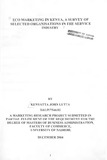| dc.description.abstract | in environmental pollution
The study surveyed eco-marketing among selected organizations in the service industry. The study was motivated by the fact that nowadays, there has been an increase in environmental pollution especially as a result of negligence and lack of legislations to enforce environmental management programmes. It focused on the following specific objectives: To determine the extent to which Kenyan organizations practice eco-marketing, and to determine the benefits that are available to companies that practice eco-marketing activities. The study was done in the form of a descriptive survey to achieve its objectives on the area of eco-marketing. A non-probability (judgmental sample) was used to obtain representative samples from the population for the purpose of achieving a more reliable and detailed information about the study population. Twelve organizations drawn from the service industry in Nairobi were selected judgmentally. Out of the twelve, only eight finally took part in the study. A questionnaire was used to collect data from the study population. The information from the questionnaire was analyzed both qualitatively and quantitatively. The findings from the study revealed that green credentials, use of recyclables paper, empowering of consumers on eco-issues and environmental products benefits are some of the modes of promotion used to create public awareness on eco-marketing practices. It was also found out that contribution to environmental groups, participation to environmental cleanup, media advertisement, restoring destroyed parts of the eco-system, public relations and community initiative projects are other major forms of eco-promotion mostly used by organisations in the service industry. It was also found out that organisations that practice eco- marketing mostly enjoy improved profit, have enhanced goodwill from stakeholders, have a boost in their eo-operate image and also have improved market share. It was also found out that most companies in the service industry either have a department or a sub-department whose aims was to deal with environmental issues especially on areas resulting from their operations. In light of the findings of the research, it was recommended that new techniques of ecopromotion should be in co-operated to counter the emerging challenges on eco-issues. Also recommended was a set of international standards that will be used across all industries to curb emissions that lead to global warming. Recycling plants to deal with recyclable waste papers and plastic cans was also recommended to be built near the-organisations area of operations. Finally, it was recommended that organisations should inco-operate research and development in their production processes to ensure that environmental efficient operations exists. This was to be in line with the existence of a co-operate environmental objectives. | en |

